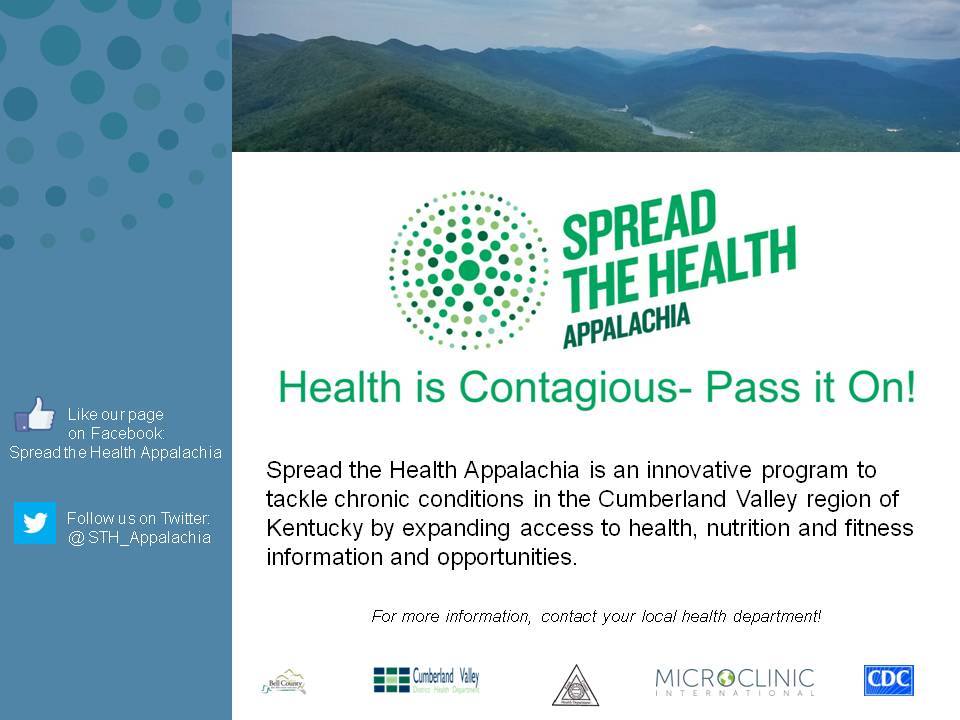Spread the Health Appalachia
Spread the Health Appalachia (STHA) was a comprehensive public health program to tackle the high rates of chronic disease in the Cumberland Valley region of Kentucky from September 2012–September 2014. Funded by a Centers for Disease Control and Prevention (CDC) Community Transformation Grant–Small Communities, and implemented in partnership with the Bell County, Knox County and Cumberland Valley District Health Departments, STHA expanded the application of MCI’s Contagious Health Model to new policy and built environment initiatives.
STHA was composed of seven integrated initiatives to improve access to:
- Opportunities that support prevention and control of chronic disease conditions;
- Healthy food options in food desert tracts and surrounding areas;
- Opportunities that promote and support increased physical activity. These initiatives were supported and framed by dynamic and engaging public health communication activities.

Through 7 widespread health initiatives and collaborations with a variety of community partners, STHA made significant contributions towards turning the tide on chronic disease in the region.
-
- Microclinic Program Initiative: Expanded the capacity of health care workforce STHA conducted Microclinic Program Facilitator Trainings, certifying 29 new facilitators in 6 counties. In doing so, the region now has more capacity to conduct chronic disease prevention and self-management programs while thousands of people with or at-risk of developing chronic disease have access to this proven program.
-
- Medical Specialists Initiative: Strengthened community-clinical linkages By engaging people’s social networks and creating communities of action, STHA helped reduce the burden on the primary care system to manage chronic disease and created more avenues for mutually reinforcing efforts among communities and the formal health care system.
-
- Farm to School Initiative: Multiplied the number of schools participating in Farm to School STHA supported 6 schools across 4 counties – 3 elementary, 1 middle and 2 high schools – to improve practical nutrition education. More than 2500 students directly benefited from a range of activities including Farm to School curriculum, library-based nutrition programs, cafeteria composting, and school gardens. All participating schools intend to continue their programs.
- Farm to School Initiative: Multiplied the number of schools participating in Farm to School STHA supported 6 schools across 4 counties – 3 elementary, 1 middle and 2 high schools – to improve practical nutrition education. More than 2500 students directly benefited from a range of activities including Farm to School curriculum, library-based nutrition programs, cafeteria composting, and school gardens. All participating schools intend to continue their programs.
-
- Shared Use Agreements Initiative: Supported the first formal shared use agreements in the region STHA successfully supported the negotiations of shared use agreements in 2 counties, opening 4 facilities for free public recreation and reaching more than 45,000 residents.
-
- Outreach and Communication Initiatives: Amplified critical public health messages STHA communication and outreach efforts had a notable impact on the level of access to and engagement with public health information, creating nearly 4 million media impressions, publishing over 50 newspaper articles in 14 publications, and reaching nearly 300,000 people through active social and traditional media efforts.
-
 Healthy2Go Initiative: Introduced the first healthy retail initiative for small stores Twelve stores across the 4 counties participated in Healthy2Go, greatly expanding access to healthy food in areas with limited access to grocery stores. Thousands of residents now have convenient access to affordable healthy options in their neighborhoods.
Healthy2Go Initiative: Introduced the first healthy retail initiative for small stores Twelve stores across the 4 counties participated in Healthy2Go, greatly expanding access to healthy food in areas with limited access to grocery stores. Thousands of residents now have convenient access to affordable healthy options in their neighborhoods.




















